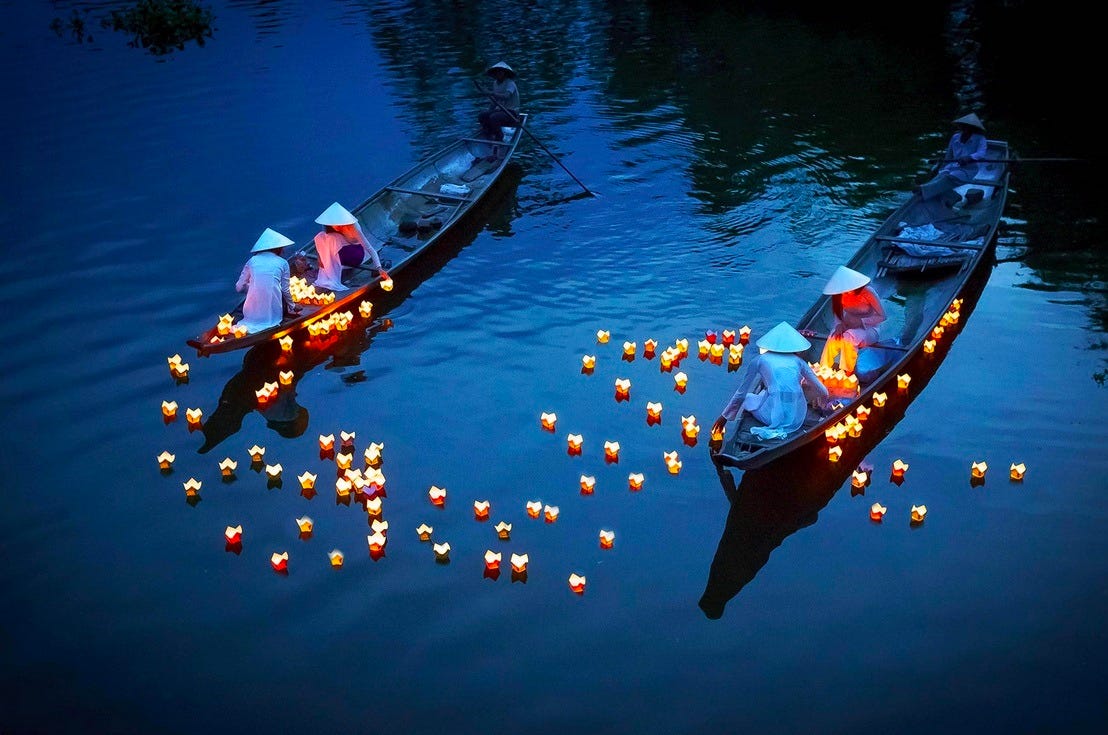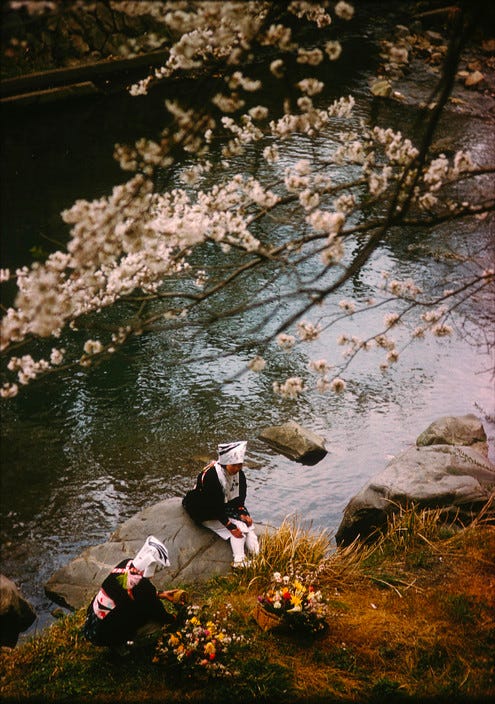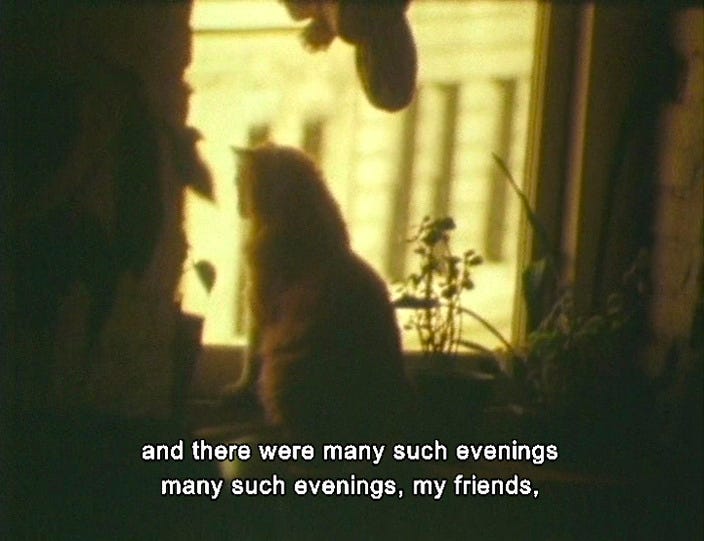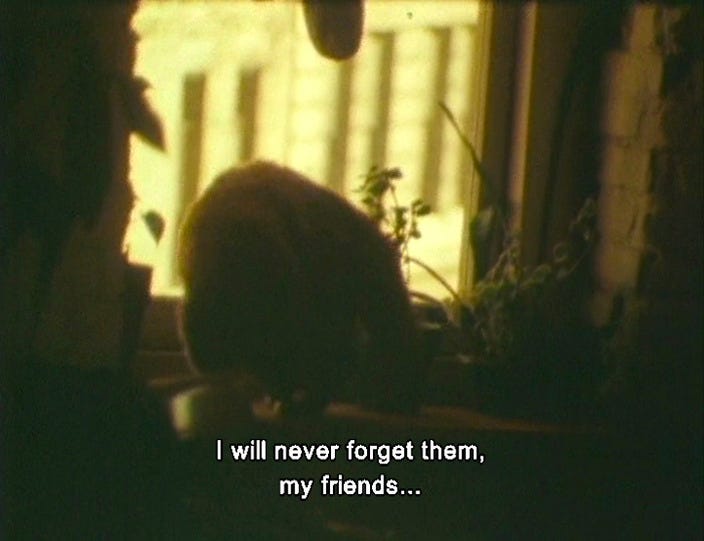dear little voice,
Doctor Hofer was a physician from Mulhouse who created the word nostalgia.
he was trying to give a name to an illness infecting the native 15th century Swiss mercenaries at war, who would spend their days crying, reminiscing endlessly about the ways of their childhoods, the smells of their mothers’ bellies, a glance from a lover thirty years ago. when they hung themselves from the branches of trees, it was with the names of their sheepdogs on their lips.
watching on, Hofer scoured his Ancient Greek dictionary for the word nostos: the word that denotes both someone’s return and the story of someone’s return. most often, this return— or nostos— is the story of the Greek hero’s journey home.
then, Hofer took the Greek word algos: which, while less directly translatable, confers a kind of aching or suffering longing.
bringing together nostos (return) and algos (longing, suffering), he created nostalgia: the melancholic structure of human time.
as Virginia Woolf wrote: “the past only comes back when the present runs so smoothly that it is like the sliding surface of a deep river.”
a man feeds seagulls from a boat in the Yamuna River on a foggy winter morning in New Delhi, India, 2018.
photographer: Adnan Abidi
in the 18th century, doctors would call it a ‘hypochondria of the heart,’ and prescribe tinctures and leeches as cures. the philosopher and writer Susan Cain would call it the bittersweet, or, “a tendency to states of longing, poignancy, and sorrow; an acute awareness of passing time; and a curiously piercing joy at the beauty of the world.’ the Portuguese would call it saudade or, ‘the love that remains’: the ache of absence, the persistent lure of a vanished elsewhere that now lies forever out of reach. we feel it not in thought but in the silence of our nerves.
time would go on, as it does, and nostalgia would soon come to be recognised as an incurable condition. today, this once-provincial ailment is now a very human disease: a mal du siècle, or a sickness of time.
prayer and candle ceremony on the Nhu Y River, Vietnam
photographer: Zay Yar Lim
in pursuit of a cure, our insistence on pinning time down with neat definitions has only revealed its tendency to unravel.
Plato, in the Timaeus, envisioned time as born of celestial choreography: the Sun, Moon, and five wandering stars circling through the twelve constellations in perfect, mathematical harmony. it was this harmony, he believed, that summoned time into being. Aristotle, however, objected: motion does not make time; time is simply the measure by which we record motion. for Aristotle, time was a neutral ledger—unchanging, impartial. not swift, but not slow either. it simply is.
Galileo later demurred: for Aristotle, an apple falls because it ‘wills’ to seek its natural home— it simply desires to be closer to the Earth. for Galileo, it falls only because invisible mechanical laws govern its path. accordingly, Galileo— and Newton and Descartes after him— banished purpose from time, reducing it to a variable in an equation. and so time became simply t: a mechanical formula—precise and predictable, yes, but perhaps devoid of pulse.
Nigeria. Warri region: Niger river delta. 1977.
photographer: Bruno Barbey.
today, modern astronomy is a little more flexible. it understands that the universe is more chaos than it is cosmos: ‘empty' space hums with particles; ‘fixed’ stars wander; particles that came into contact briefly still mirror one another from lightyears away; a day on Venus lasts longer than its year. there is the time of a mayfly, measured in hours, but there is also the time of a bristlecone pine, unfurling across centuries. there is the time of making love, all quick, bright frenzy, incandescent and urgent, and there is time slowed to the pace of a dripping stalactite, where each drop marks a century. there is the time of long, brilliant summers which stretch out to dry, too hot to do anything but drink and let letters rot in the mailbox and wait for the cool that comes out with the stars. and there is compressed, digital time glittering with the the urgency of messages and telephones calls. there is the time of kisses: of private thrums of joy that blossom minutes into quiet epics, and that of the oppressive tunnel of grief that contracts hours into breaths. there is geological time, indifferent to our calendars, groaning at the pace of slow-shifting tectonic plates, and there is the digital time of algorithms, sparkling across milliseconds in search of patterns. there is the expanding and deflating time of stories. the fragmented time of memory. the strange, rosy time of longing and of love. Carlo Rovelli says of our ‘quantum ignorance’: “when we have uncovered every aspect of time that can be spoken of, then we have found time.” for now, then, we have not found time. for all our scrutiny, time remains unknowable—except for the one certainty we share across its every scale: the only thing we can be certain of in all times is that all times will end.
Sunset over Li river, China.
photographer: Smoothy
and then there is the philosophy of ancient Greece, in which time exists in a duality of chronos— the forward-moving time we experience chronologically, ordered by calendars, hours, watch-faces, phases of the moon, days— and kairos— roughly translated into english as the right time. kairos is not propelled by watch-faces or moons. it is untethered by any clock or calendar. instead, it is time measured by time’s seeming dissolution: instances when the seconds-long bliss of a kiss goodbye suddenly spans centuries, or the hours spent revelling in delicious company somehow vanishes in mere seconds. kairos is the strange space where the eternal and the ephemeral converge.
the philosopher Heraclitus gave us the famous dictum: “no man ever steps in the same river twice, for it is not the same river and he is not the same man.” it is true that we never inhabit the same moment of chronos twice. and indeed, i am not the person who began this sentence, nor am i now the one who finished it. but: crouch by a river. dip your hand into the cool stream: yes, in an instant the particles of water which first touched you have floated yards down the current, though your hand remains there. yet withdraw your hand, and though your body doesn’t, in memory you still inhabit the water: you delight in the gleam of its oily residue, feel the cool wind on damp knuckles, and wonder at the endless cycle that carried those same droplets from the sky to the earth before you and soon into your body, to stream into your bones. its particles once formed thunderbolts and dinosaur tears; but they also shares their material with that which you too are made of: breath, bones, a mind that renders your reality what it is, the only place where reason and wonder exist, where love matters and beauty means anything, where you hold knowledge of the constellations of stars and your grandfather’s laughter, your curious questions about whether or not you turned off the stove this morning and what is love?
you have never been submerged merely in chronos. chronos feels only the surface of water, the brief disturbance of time before kairos returns. the brook’s water is gone; but the moment remains, lodged inside of you, as real as tendon or bone. chronos may tally our lives in increments, but kairos opens us to the spaces in which life happens.
yes, ‘time is a river which sweeps me along,’ as Borges wrote, ‘but I am the river; it is a tiger which destroys me, but I am the tiger; it is a fire which consumes me, but I am the fire.’
cherry blossom time along the river Kamo, Kyoto, Japan, 1961.
photographer: Burt Glinn
in my own quantum ignorance, i can only think of time as being like a river: it may begin as a trembling spring in some nameless highland, or seep from a dying glacier, or congeal in a marsh too remote for maps. from that hidden source it will wander through every conceivable terrain—prairie, city, forest, desert—eroding rock, depositing sediment, reshaping itself and everything around it. it leaps in waterfalls and slinks through marshes; it vanishes underground, only to reemerge elsewhere. its course is neither straight nor predictable, and yet it always arrives.
like time, rivers are a thread, an unlabored seam in the fabric of place. it embroiders landscapes with the residue of human history and ambition— coins cast as prayers, rusted machines, the silt of ancient floods, lovers’ trysts amidst its swaying reeds—alongside dragonflies and hippos, indifferent to origin or value. to the river, the story of the mayfly is no less weighty than that of the empire; both are simply carried downstream.
it seems we are always in such a hurry that kairos has become a luxury we cannot afford. the consequence is an ever-repeating shallowness—a blur of breakfasts and commutes and meetings that, years later, leave us asking where the river took the hours and longing for their return; for their nostos. tethered to chronos, we live our lives as if time were merely t— a variable in some equation we barely understand.
but the river reminds us that no equation and no plan survive contact with this current: no temporal success, no busyness, no shrine, no name carved in stone. there is no legacy that can resist the water. it is in the meeting of our need for order and the river’s indifference that we glimpse the true nature of time: an unfolding, irreducible mystery, carrying us—and everything we have been—into what will follow.
Hart Crane, from “My Grandmother’s Love Letters”, The Collected Poems of Hart Crane
“when it hurts,” the poet czesław miłosz wrote, “we return to the banks of certain rivers.”
moments of nostalgia are moments of an involuntary disorganisation of time; hallucinatory returns of experience that coalesce like sudden shards of shattered glass to render time an unruly kaleidoscope. i’ve come to believe that this too is proof both of our capacity for kairos—those charged, timeless instants of sheer remembering—and our human need to deny chronos its control over our lives. in memory, we become architects of time rather than its prisoners. by recalling, by longing, we shatter the straight line of minutes and hours. past, present, and future fold into one elastic now—surreal, swelling like an accordion under the weight of feeling. we are pulled to now-gone moments as metal to a magnet: you ride a train and the sudden scent of a perfume floods you with the arms of your grandmother. you bite into a madeleine biscuit and, for an instant, you are six again. you lie on a living-room floor, the same song vibrating through the speakers for the umpteenth time, and you are back in that car on a july afternoon, listening to it for the very first time, heat throbbing in the upholstery, windows down, your own delight rising with every chord. this serves no purpose other than to be experienced.
in that brief return we glimpse what time might be without the tyranny of clocks. we feel kairos: the suspension of chronology, the collapse of “before” and “after” into a single breath. for a moment, we are not creatures measured by schedules and deadlines, but storytellers weaving what has been and what is into the love that remains. kairos lives in those instants when time collapses and stills: the pause between breath and thought, the flash of recognition that we are not the hand in the water: rather, we are both water and bank.
chronos measures the river’s flow in seconds and years; kairos dwells in the instantaneous flash when light fractures on a wave.
as Frida Kahlo wrote: “I do not think that the banks of a river suffer because they let the river flow.”
Map depicting the changing course of the Mississippi river.
Harold Fisk, 1944.
rivers remind us that the boundary between life and death is porous and inevitable. water is moved by the current, yes: but it also spills over banks, seeps into earth, rises again in mist and rain. everything leaves. but nothing is ever wholly gone.
just as there are countless forms of time—chronos and kairos, geological epochs and split-second revelations—so too are there countless ways of being in time. to step away from chronos— even if for a moment— and inhabit kairos is to magnify life to itself— the word life stemming from the Latin vita for: to make great. Virginia Woolf described the capacity to understand this as the gift of all artists, or, the ‘shock-receiving capacity’: the ability to absorb the totality of existence, both life and death, and create something luminous.
why should life last longer than a cloud?
Dave Hilton
we lengthen our days by pausing over the small intrusions of beauty that compose this unlikely cosmos—the curl of dew on a blade of grass, the strange geometry of a spider’s web— but chronos evolved to screen out such wonders, compressing them into data points we can tally and categorise—turning the flash of sunrise into daybreak and the hum of crickets into noise. its filters may spare us from being totally undone by awe, but they can also blind us to the moments that make life beautiful.
Iris Murdoch defined love as ‘the extremely difficult realisation that something other than oneself is real.’ to love anything is to train oneself in the art of attention. noticing, in its humble particularity— paying attention— is perhaps the only real precursor to love.
as Richard Jeffries writes in The Life of the Fields “the hours when the mind is absorbed by beauty are the only hours when we really live:
‘The exceeding beauty of the earth, in her splendour of life, yields a new thought with every petal. The hours when the mind is absorbed by beauty are the only hours when we really live, so that the longer we can stay among these things so much the more is snatched from inevitable Time…
…These are the only hours that are not wasted — these hours that absorb the soul and fill it with beauty. This is real life, and all else is illusion, or mere endurance. Does this reverie of flowers and waterfall and song form an ideal, a human ideal, in the mind? It does; much the same ideal that Phidias sculptured of man and woman filled with a godlike sense of the violet fields of Greece, beautiful beyond thought, calm as my turtle-dove before the lurid lightning of the unknown. To be beautiful and to be calm, without mental fear, is the ideal of nature.’
Portugal. Porto. a barco rabelo— or cargo boat— carries Porto wine down the Douro river, 1985.
photographer: Bruno Barbey.
recently i was asked to imagine having only a year left to live— what would i do with it?
i have thought about this question and i have come to the decision that i would stay here. i would continue to write a little while at my desk, maybe finish the poem i started on a napkin in a thai restaurant last thursday. maybe not. maybe i’d just look at it a while and give up— it’s not important—think about the curiousness of language, end up writing a list of my favourite words instead. i would light the candle perched in an old wine bottle that sits by the typewriter. i would peel an orange. i would play some music. i would call a friend. i would lick honey from a spoon. i would go for a walk. i would leave my shoes at home. i would walk to wherever roses are. i would sit down quietly and i would listen. apple trees, music, the gift of language, of one another. sunlight. it’s all too much.
it doesn’t have to be so hard.
i quite like being alive.
this is a very beautiful thought to think, and even more beautiful to feel.
the moon hangs over the Sol Duc River at a popular fishing spot.
photographer: Trevor Anderson
on the final evening before it all ends, i would lie down in arms of someone i love. i would kiss their eyelids. together we would sit for a while. we would talk about the weather— it has been a perfectly warm beginning to autumn, and the hollows of the trees are just now beginning to grow mossy— and point out the little birds— six, maybe seven— resting in the jacaranda through the window. i would say: tell me about that time again. we would laugh. i would ask: have you ever licked honey from a spoon? soon above us flowers will grow and people will stomp, fall in love, do their taxes, peel oranges and point out the birds. i would have no thought before the final blow. only the lovely sensation of those arms around me, the quiet of the house, the final flight of the birds from the jacaranda, the memory of the few poems i have written and the good i have done.
no, it doesn’t have to be so hard.
love,
ars poetica.
if this has brought you something, please consider buying me a book so that I may continue to tuck Words in your pocket:
As I Was Moving Ahead Occasionally I Saw Brief Glimpses of Beauty
(Jonas Mekas, 2000)
PS: as Margaret Renkl writes in The Comfort of Crows:
‘Stop and look at the tangled rootlets of the poison ivy vine climbing the locust tree. Notice the way they twist around each other like plaits in a golden braid, like tendrils of seaweed washed to shore…
Stop and ponder the skeleton of the snakeroot plant, each twig covered in tiny brown stars. The white petals, once embraced by bees, have dried to powder and now dust the forest floor, but here are the star-shaped sepals that held those fluffs of botanical celebration…
Stop and listen to the ragged-edged beech leaves, pale specters of the winter forest. They are chattering ghosts, clattering amid the bare branches of the other hardwoods. Wan light pours through their evanescence and burnishes them to gleaming. Deep in the gray, sleeping forest, whole beech trees flare up into whispering creatures made of trembling gold.
Stop and consider the deep hollows of the persimmon’s bark, the way the tree has carved its own skin into neat rectangles of sturdy protection. See how the lacy lichens have found purchase in the channels, sharing space in the hollows…
Stop and peer at the hummingbird nest, smaller than your thumb, in the crook of the farthest reach of an oak branch. Remember the whir of hummingbird wings. Remember the green flash of hummingbird light.’





















Utterly a beautiful contemplation..
how could one ever write about rivers again after THIS....mindblowing